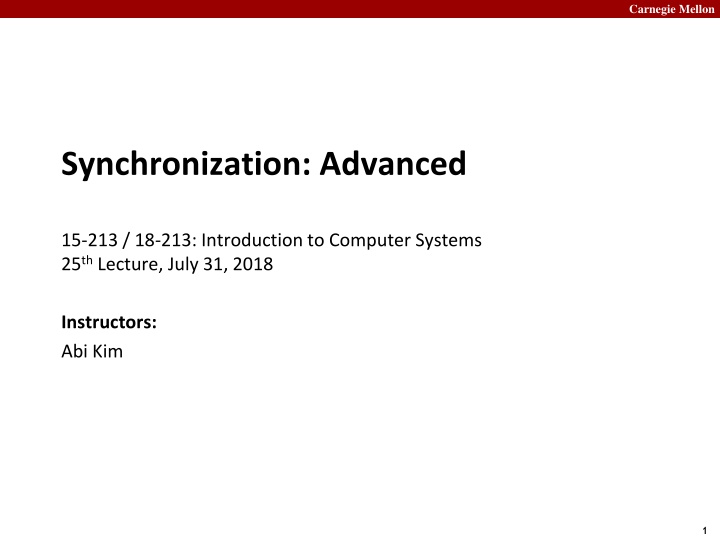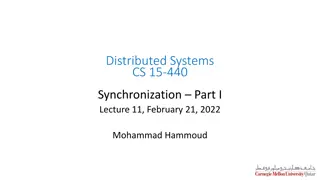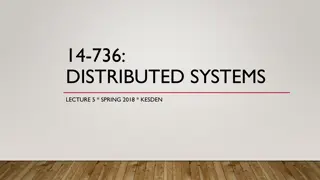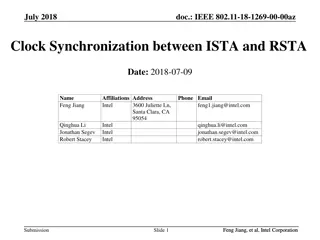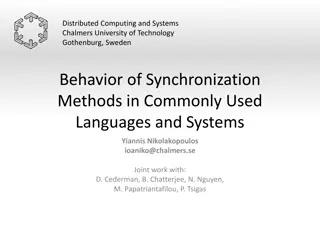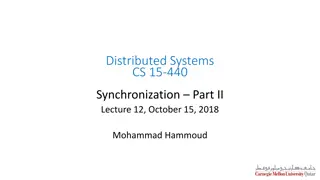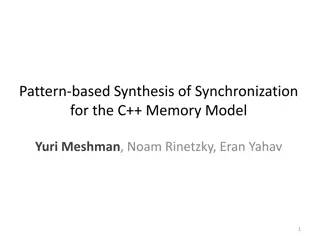Synchronization: Advanced
This lecture series at Carnegie Mellon University delves into advanced synchronization techniques in computer systems. Learn about semaphores, mutual exclusion, coordinating shared resources, and solving concurrency issues with semaphores. Explore classic problems like the Producer-Consumer and Readers-Writers scenarios, along with practical examples and synchronization patterns.
Download Presentation

Please find below an Image/Link to download the presentation.
The content on the website is provided AS IS for your information and personal use only. It may not be sold, licensed, or shared on other websites without obtaining consent from the author.If you encounter any issues during the download, it is possible that the publisher has removed the file from their server.
You are allowed to download the files provided on this website for personal or commercial use, subject to the condition that they are used lawfully. All files are the property of their respective owners.
The content on the website is provided AS IS for your information and personal use only. It may not be sold, licensed, or shared on other websites without obtaining consent from the author.
E N D
Presentation Transcript
Carnegie Mellon Synchronization: Advanced 15-213 / 18-213: Introduction to Computer Systems 25thLecture, July 31, 2018 Instructors: Abi Kim 1
Carnegie Mellon Reminder: Semaphores Semaphore: non-negative global integer synchronization variable Manipulated by P and V operations: P(s): [ while (s == 0) wait(); s--; ] Dutch for "Proberen" (test) V(s): [ s++; ] Dutch for "Verhogen" (increment) OS kernel guarantees that operations between brackets [ ] are executed atomically Only one P or V operation at a time can modify s. When while loop in P terminates, only that P can decrement s Semaphore invariant: (s >= 0) 2
Carnegie Mellon Review: Using semaphores to protect shared resources via mutual exclusion Basic idea: Associate a unique semaphore mutex, initially 1, with each shared variable (or related set of shared variables) Surround each access to the shared variable(s) with P(mutex) and V(mutex) operations mutex = 1 P(mutex) cnt++ V(mutex) 3
Carnegie Mellon Today Using semaphores to schedule shared resources Producer-consumer problem Readers-writers problem Other concurrency issues Thread safety Races Deadlocks 4
Carnegie Mellon Using Semaphores to Coordinate Access to Shared Resources Basic idea: Thread uses a semaphore operation to notify another thread that some condition has become true Use counting semaphores to keep track of resource state. Use binary semaphores to notify other threads. Two classic examples: The Producer-Consumer Problem The Readers-Writers Problem 5
Carnegie Mellon Producer-Consumer Problem produc er thread consu mer thread shared buffer Common synchronization pattern: Producer waits for empty slot, inserts item in buffer, and notifies consumer Consumer waits for item, removes it from buffer, and notifies producer Examples Multimedia processing: Producer creates video frames, consumer renders them Event-driven graphical user interfaces Producer detects mouse clicks, mouse movements, and keyboard hits and inserts corresponding events in buffer Consumer retrieves events from buffer and paints the display 6
Carnegie Mellon Producer-Consumer on 1-element Buffer Maintain two semaphores: full + empty full 0 empty buffer empty 1 full 1 full buffer empty 0 7
Carnegie Mellon Producer-Consumer on 1-element Buffer #include "csapp.h" int main(int argc, char** argv) { pthread_t tid_producer; pthread_t tid_consumer; #define NITERS 5 void *producer(void *arg); void *consumer(void *arg); /* Initialize the semaphores */ Sem_init(&shared.empty, 0, 1); Sem_init(&shared.full, 0, 0); struct { int buf; /* shared var */ sem_t full; /* sems */ sem_t empty; } shared; /* Create threads and wait */ Pthread_create(&tid_producer, NULL, producer, NULL); Pthread_create(&tid_consumer, NULL, consumer, NULL); Pthread_join(tid_producer, NULL); Pthread_join(tid_consumer, NULL); return 0; } 8
Carnegie Mellon Producer-Consumer on 1-element Buffer Initially: empty==1, full==0 Producer Thread Consumer Thread void *consumer(void *arg) { int i, item; void *producer(void *arg) { int i, item; for (i=0; i<NITERS; i++) { /* Read item from buf */ P(&shared.full); item = shared.buf; V(&shared.empty); for (i=0; i<NITERS; i++) { /* Produce item */ item = i; printf("produced %d\n", item); /* Consume item */ printf("consumed %d\n , item); /* Write item to buf */ P(&shared.empty); shared.buf = item; V(&shared.full); } return NULL; } } return NULL; } 9
Carnegie Mellon Why 2 Semaphores for 1-Entry Buffer? Consider multiple producers & multiple consumers P C 1 1 shared buffer P C n m Producers will contend with each to get empty Consumers will contend with each other to get full Producers Consumers empty full P(&shared.empty); shared.buf = item; V(&shared.full); P(&shared.full); item = shared.buf; V(&shared.empty); 10
Carnegie Mellon Producer-Consumer on an n-element Buffer Between 0 and n elements P C 1 1 P C n m Implemented using a shared buffer package called sbuf. 11
Carnegie Mellon Circular Buffer (n = 10) Store elements in array of size n items: number of elements in buffer Empty buffer: front = rear Nonempty buffer rear: index of most recently inserted element front: index of next element to remove 1 (mod n) Initially: front 0 0 9 8 7 6 5 4 3 2 1 rear 0 items 0 12
Carnegie Mellon Circular Buffer Operation (n = 10) Insert 7 elements front 0 0 9 8 7 6 5 4 3 2 1 rear 7 items 7 Remove 5 elements Insert 6 elements Remove 8 elements 13
Carnegie Mellon Circular Buffer Operation (n = 10) Insert 7 elements front 0 0 9 8 7 6 5 4 3 2 1 rear 7 items 7 Remove 5 elements front 5 0 9 8 7 6 5 4 3 2 1 rear 7 items 2 Insert 6 elements Remove 8 elements 14
Carnegie Mellon Circular Buffer Operation (n = 10) Insert 7 elements front 0 0 9 8 7 6 5 4 3 2 1 rear 7 items 7 Remove 5 elements front 5 0 9 8 7 6 5 4 3 2 1 rear 7 items 2 Insert 6 elements front 5 0 9 8 7 6 5 4 3 2 1 rear 3 items 8 Remove 8 elements front 3 0 9 8 7 6 5 4 3 2 1 rear 3 items 0 15
Carnegie Mellon Circular Buffer Operation (n = 10) Insert 7 elements front 0 0 9 8 7 6 5 4 3 2 1 rear 7 items 7 Remove 5 elements front 5 0 9 8 7 6 5 4 3 2 1 rear 7 items 2 Insert 6 elements front 5 0 9 8 7 6 5 4 3 2 1 rear 3 items 8 Remove 8 elements front 3 0 9 8 7 6 5 4 3 2 1 rear 3 items 0 16
Carnegie Mellon Sequential Circular Buffer Code init(int v) { items = front = rear = 0; } insert(int v) { if (items >= n) error(); if (++rear >= n) rear = 0; buf[rear] = v; items++; } int remove() { if (items == 0) error(); if (++front >= n) front = 0; int v = buf[front]; items--; return v; } 17
Carnegie Mellon Producer-Consumer on an n-element Buffer Between 0 and n elements P C 1 1 P C n m Requires a mutex and two counting semaphores: mutex: enforces mutually exclusive access to the buffer and counters slots: counts the available slots in the buffer items: counts the available items in the buffer Makes use of general semaphores Will range in value from 0 to n 18
Carnegie Mellon sbuf Package - Declarations #include "csapp.h typedef struct { int *buf; /* Buffer array */ int n; /* Maximum number of slots */ int front; /* buf[front+1 (mod n)] is first item */ int rear; /* buf[rear] is last item */ sem_t mutex; /* Protects accesses to buf */ sem_t slots; /* Counts available slots */ sem_t items; /* Counts available items */ } sbuf_t; void sbuf_init(sbuf_t *sp, int n); void sbuf_deinit(sbuf_t *sp); void sbuf_insert(sbuf_t *sp, int item); int sbuf_remove(sbuf_t *sp); sbuf. h 19
Carnegie Mellon sbuf Package - Implementation Initializing and deinitializing a shared buffer: /* Create an empty, bounded, shared FIFO buffer with n slots */ void sbuf_init(sbuf_t *sp, int n) { sp->buf = Calloc(n, sizeof(int)); sp->n = n; /* Buffer holds max of n items */ sp->front = sp->rear = 0; /* Empty buffer iff front == rear */ Sem_init(&sp->mutex, 0, 1); /* Binary semaphore for locking */ Sem_init(&sp->slots, 0, n); /* Initially, buf has n empty slots */ Sem_init(&sp->items, 0, 0); /* Initially, buf has zero items */ } /* Clean up buffer sp */ void sbuf_deinit(sbuf_t *sp) { Free(sp->buf); } sbuf. c 20
Carnegie Mellon sbuf Package - Implementation Inserting an item into a shared buffer: /* Insert item onto the rear of shared buffer sp */ void sbuf_insert(sbuf_t *sp, int item) { P(&sp->slots); /* Wait for available slot */ P(&sp->mutex); /* Lock the buffer */ if (++sp->rear >= sp->n) /* Increment index (mod n) */ sp->rear = 0; sp->buf[sp->rear] = item; /* Insert the item */ V(&sp->mutex); /* Unlock the buffer */ V(&sp->items); /* Announce available item */ } insert(int v) { if (items >= n) error(); if (++rear >= n) rear = 0; buf[rear] = v; items++; } sbuf. c 21
Carnegie Mellon sbuf Package - Implementation Removing an item from a shared buffer: /* Remove and return the first item from buffer sp */ int sbuf_remove(sbuf_t *sp) { int item; P(&sp->items); /* Wait for available item */ P(&sp->mutex); /* Lock the buffer */ if (++sp->front >= sp->n) /* Increment index (mod n) */ sp->front = 0; item = sp->buf[sp->front]; /* Remove the item */ V(&sp->mutex); /* Unlock the buffer */ V(&sp->slots); /* Announce available slot */ return item; } int remove() { if (items == 0) error(); if (++front >= n) front = 0; int v = buf[front]; items--; return v; } sbuf. c 22
Carnegie Mellon Demonstration See program produce-consume.c in code directory 10-entry shared circular buffer 5 producers Agent i generates numbers from 20*i to 20*i 1. Puts them in buffer 5 consumers Each retrieves 20 elements from buffer Main program Makes sure each value between 0 and 99 retrieved once 23
Carnegie Mellon Sample program using sbuf void * producer(void *vargp) { int cnt = 0; while (maxcnt > 0) { sbuf_insert(&sbuf, cnt); cnt++; maxcnt--; } sbuf_insert(&sbuf, -1); pthread_exit(0); } void * consumer(void *vargp) { int sum = 0; while (1) { int val = sbuf_remove(&sbuf); if (val < 0) break; sum += val; } total = sum; pthread_exit(0); } 24
Carnegie Mellon Is there another way? One producer and one consumer /* Insert item onto the rear of shared buffer sp */ void sbuf_insert(sbuf_t *sp, int item) { P(&sp->slots); /* Wait for available slot */ P(&sp->mutex); /* Lock the buffer */ sp->buf[(++sp->rear)%(sp->n)] = item; /* Insert the item */ V(&sp->mutex); /* Unlock the buffer */ V(&sp->items); /* Announce available item */ } /* Remove and return the first item from buffer sp */ int sbuf_remove(sbuf_t *sp) { int item; P(&sp->items); /* Wait for available item */ P(&sp->mutex); /* Lock the buffer */ item = sp->buf[(++sp->front)%(sp->n)]; /* Remove the item */ V(&sp->mutex); /* Unlock the buffer */ V(&sp->slots); /* Announce available slot */ return item; } 25
Carnegie Mellon Shared variable analysis variable prod cons0 cons1 buf Buf[k] rear front n Items slots 26
Carnegie Mellon Is there another way? One producer and one consumer /* Insert item onto the rear of shared buffer sp */ void sbuf_insert(sbuf_t *sp, int item) { P(&sp->slots); /* Wait for available slot */ P(&sp->mutex); /* Lock the buffer */ sp->buf[(++sp->rear)%(sp->n)] = item; /* Insert the item */ V(&sp->mutex); /* Unlock the buffer */ V(&sp->items); /* Announce available item */ } /* Remove and return the first item from buffer sp */ int sbuf_remove(sbuf_t *sp) { int item; P(&sp->items); /* Wait for available item */ P(&sp->mutex); /* Lock the buffer */ item = sp->buf[(++sp->front)%(sp->n)]; /* Remove the item */ V(&sp->mutex); /* Unlock the buffer */ V(&sp->slots); /* Announce available slot */ return item; } 27
Carnegie Mellon Do we need semaphores at all? /* Insert item onto the rear of shared buffer sp */ void sbuf_insert(sbuf_t *sp, int item) { P(&sp->slots); /* Wait for available slot */ sp->buf[(++sp->rear)%(sp->n)] = item; /* Insert the item */ V(&sp->items); /* Announce available item */ } /* Remove and return the first item from buffer sp */ int sbuf_remove(sbuf_t *sp) { int item; P(&sp->items); /* Wait for available item */ item = sp->buf[(++sp->front)%(sp->n)]; /* Remove the item */ V(&sp->slots); /* Announce available slot */ return item; } 28
Carnegie Mellon Are Front and rear (really) shared? typedef struct { int *buf; int n; int front; int rear; int cnt; } sbuf_t; void sbuf_init(sbuf_t *sp, int n) { sp->n = n; sp->buf = calloc(sizeof(int), n); sp->front = 0; sp->rear = 0; sp->cnt = 0; } 29
Carnegie Mellon Are Front and rear (really) shared? int sbuf_remove(sbuf_t* sp) { while (sp->front == sp->rear) pthread_yield(); int next = sp->front+1; if (next == sp->n) next = 0; int val = sp->buf[sp->front]; sp->front = next; return val; } void sbuf_insert(sbuf_t* sp, int v) { int next = sp->rear+1; if (next == sp->n) next = 0; while (next == sp->front) pthread_yield(); sp->buf[sp->rear] = v; sp->rear = next; } 30
Carnegie Mellon Are Front and rear (really) shared? int sbuf_remove(sbuf_t* sp) { while (sp->front == sp->rear) pthread_yield(); int next = sp->front+1; if (next == sp->n) next = 0; int val = sp->buf[sp->front]; sp->front = next; return val; } void sbuf_insert(sbuf_t* sp, int v) { int next = sp->rear+1; if (next == sp->n) next = 0; while (next == sp->front) pthread_yield(); sp->buf[sp->rear] = v; sp->rear = next; } 31
Carnegie Mellon Are Front and rear (really) shared? int sbuf_remove(sbuf_t* sp) { while (sp->front == sp->rear) pthread_yield(); int next = sp->front+1; if (next == sp->n) next = 0; int val = sp->buf[sp->front]; sp->front = next; return val; } void sbuf_insert(sbuf_t* sp, int v) { int next = sp->rear+1; if (next == sp->n) next = 0; while (next == sp->front) pthread_yield(); sp->buf[sp->rear] = v; sp->rear = next; } Why does this work for ONLY 1 producer and 1 consumer? 32
Carnegie Mellon Front and rear are really shared! int sbuf_remove(sbuf_t* sp) { while (sp->front == sp->rear) pthread_yield(); int next = sp->front+1; if (next == sp->n) next = 0; int val = sp->buf[sp->front]; sp->front = next; return val; } void sbuf_insert(sbuf_t* sp, int v) { int next = sp->rear+1; if (next == sp->n) next = 0; while (next == sp->front) pthread_yield(); sp->buf[sp->rear] = v; sp->rear = next; } Why does this work for ONLY 1 producer and 1 consumer? 33
Carnegie Mellon Timing Where are the overheads? How important are the overheads? Choose your package carefully. Original sbuf w/3 semaphores Seconds Original sbuf w/2 semaphores No locks! User-level threads 2 4 8 16 32 64 128 Size of Queue 34
Carnegie Mellon Today Using semaphores to schedule shared resources Producer-consumer problem Readers-writers problem Other concurrency issues Thread safety Races Deadlocks 35
Carnegie Mellon Readers-Writers Problem W R 1 1 Read/ Write Access W Read-only Access R 2 2 W R 3 3 Problem statement: Reader threads only read the object Writer threads modify the object (read/write access) Writers must have exclusive access to the object Unlimited number of readers can access the object Occurs frequently in real systems, e.g., Online airline reservation system Multithreaded caching Web proxy 36
Carnegie Mellon Readers/Writers Examples W R 1 1 W R 2 2 W R 3 3 W R 1 1 W R 2 2 W R 3 3 37
Carnegie Mellon Variants of Readers-Writers First readers-writers problem (favors readers) No reader should be kept waiting unless a writer has already been granted permission to use the object. A reader that arrives after a waiting writer gets priority over the writer. Second readers-writers problem (favors writers) Once a writer is ready to write, it performs its write as soon as possible A reader that arrives after a writer must wait, even if the writer is also waiting. Starvation (where a thread waits indefinitely) is possible in both cases. 38
Carnegie Mellon Solution to First Readers-Writers Problem Writers : Readers: void writer(void) { while (1) { P(&w); int readcnt; /* Initially 0 */ sem_t mutex, w; /* Both initially 1 */ void reader(void) { while (1) { P(&mutex); readcnt++; if (readcnt == 1) /* First in */ P(&w); V(&mutex); /* Writing here */ V(&w); } } rw1.c /* Reading happens here */ P(&mutex); readcnt--; if (readcnt == 0) /* Last out */ V(&w); V(&mutex); } } 39
Carnegie Mellon Readers/Writers Examples W R 1 1 w = 1 readcnt = 0 W R 2 2 W R 3 3 W R 1 1 w = 0 readcnt = 0 W R 2 2 W R 3 3 W R 1 1 w = 0 readcnt = 2 W R 2 2 W R 3 3 40
Carnegie Mellon Solution to First Readers-Writers Problem Writers : Readers: void writer(void) { while (1) { P(&w); int readcnt; /* Initially 0 */ sem_t mutex, w; /* Both initially 1 */ void reader(void) { while (1) { P(&mutex); readcnt++; if (readcnt == 1) /* First in */ P(&w); V(&mutex); /* Writing here */ V(&w); } } rw1.c /* Reading happens here */ Arrivals: R1 R2 W1 R3 P(&mutex); readcnt--; if (readcnt == 0) /* Last out */ V(&w); V(&mutex); } } 41
Carnegie Mellon Solution to First Readers-Writers Problem Writers : Readers: void writer(void) { while (1) { P(&w); int readcnt; /* Initially 0 */ sem_t mutex, w; /* Both initially 1 */ void reader(void) { while (1) { P(&mutex); readcnt++; if (readcnt == 1) /* First in */ P(&w); V(&mutex); /* Writing here */ V(&w); } } rw1.c R1 /* Reading happens here */ Arrivals: R1 R2 W1 R3 P(&mutex); readcnt--; if (readcnt == 0) /* Last out */ V(&w); V(&mutex); Readcnt == 1 W == 0 } } 42
Carnegie Mellon Solution to First Readers-Writers Problem Writers : Readers: void writer(void) { while (1) { P(&w); int readcnt; /* Initially 0 */ sem_t mutex, w; /* Both initially 1 */ void reader(void) { while (1) { P(&mutex); readcnt++; if (readcnt == 1) /* First in */ P(&w); V(&mutex); /* Writing here */ V(&w); R2 } } rw1.c R1 /* Reading happens here */ Arrivals: R1 R2 W1 R3 P(&mutex); readcnt--; if (readcnt == 0) /* Last out */ V(&w); V(&mutex); Readcnt == 2 W == 0 } } 43
Carnegie Mellon Solution to First Readers-Writers Problem Writers : Readers: void writer(void) { while (1) { P(&w); int readcnt; /* Initially 0 */ sem_t mutex, w; /* Both initially 1 */ W1 void reader(void) { while (1) { P(&mutex); readcnt++; if (readcnt == 1) /* First in */ P(&w); V(&mutex); R2 /* Writing here */ V(&w); } } rw1.c R1 /* Reading happens here */ Arrivals: R1 R2 W1 R3 P(&mutex); readcnt--; if (readcnt == 0) /* Last out */ V(&w); V(&mutex); Readcnt == 2 W == 0 } } 44
Carnegie Mellon Solution to First Readers-Writers Problem Writers : Readers: void writer(void) { while (1) { P(&w); int readcnt; /* Initially 0 */ sem_t mutex, w; /* Both initially 1 */ W1 void reader(void) { while (1) { P(&mutex); readcnt++; if (readcnt == 1) /* First in */ P(&w); V(&mutex); /* Writing here */ V(&w); } } rw1.c /* Reading happens here */ R2 Arrivals: R1 R2 W1 R3 P(&mutex); readcnt--; if (readcnt == 0) /* Last out */ V(&w); V(&mutex); Readcnt == 1 W == 0 R1 } } 45
Carnegie Mellon Solution to First Readers-Writers Problem Writers : Readers: void writer(void) { while (1) { P(&w); int readcnt; /* Initially 0 */ sem_t mutex, w; /* Both initially 1 */ W1 void reader(void) { while (1) { P(&mutex); readcnt++; if (readcnt == 1) /* First in */ P(&w); V(&mutex); /* Writing here */ V(&w); R3 } } rw1.c /* Reading happens here */ Arrivals: R1 R2 W1 R3 R2 P(&mutex); readcnt--; if (readcnt == 0) /* Last out */ V(&w); V(&mutex); Readcnt == 2 W == 0 } R1 } 46
Carnegie Mellon Solution to First Readers-Writers Problem Writers : Readers: void writer(void) { while (1) { P(&w); int readcnt; /* Initially 0 */ sem_t mutex, w; /* Both initially 1 */ W1 void reader(void) { while (1) { P(&mutex); readcnt++; if (readcnt == 1) /* First in */ P(&w); V(&mutex); R3 /* Writing here */ V(&w); } } rw1.c /* Reading happens here */ Arrivals: R1 R2 W1 R3 P(&mutex); readcnt--; if (readcnt == 0) /* Last out */ V(&w); V(&mutex); Readcnt == 1 W == 0 R2 } } 47
Carnegie Mellon Solution to First Readers-Writers Problem Writers : Readers: void writer(void) { while (1) { P(&w); int readcnt; /* Initially 0 */ sem_t mutex, w; /* Both initially 1 */ W1 void reader(void) { while (1) { P(&mutex); readcnt++; if (readcnt == 1) /* First in */ P(&w); V(&mutex); /* Writing here */ V(&w); } } rw1.c /* Reading happens here */ Arrivals: R1 R2 W1 R3 P(&mutex); readcnt--; if (readcnt == 0) /* Last out */ V(&w); V(&mutex); Readcnt == 0 W == 1 R3 } } 48
Carnegie Mellon Demonstration See program read-write.c 100 agents ~20% are writers. They write their ID to global variable Rest are readers. They read the global variable 49
Carnegie Mellon Today Using semaphores to schedule shared resources Producer-consumer problem Readers-writers problem Other concurrency issues Races Deadlocks Thread safety 50
